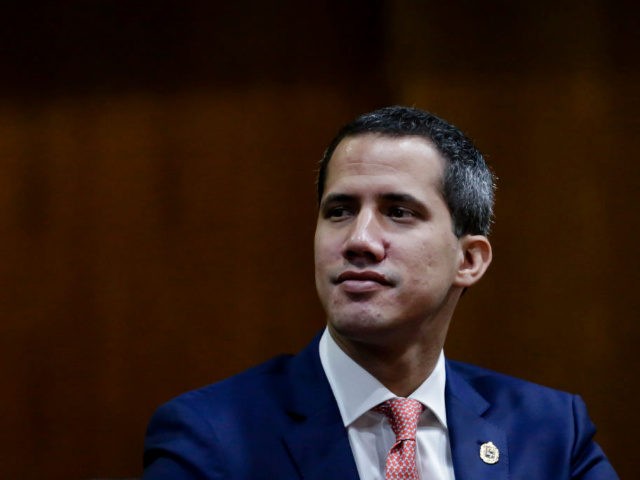The U.S. State Department announced on Wednesday the establishment of the Venezuela Affairs Unit (VAU) in neighboring Colombia, intended to serve as a de facto embassy to maintain relations with the legitimate Venezuelan government of President Juan Guaidó.
Dictator Nicolás Maduro shut down the American Embassy in Caracas and its counterpart in Washington in January, shortly after his term as president expired. Maduro refused to vacate the presidency, forcing the National Assembly to use its constitutional powers to appoint Guaidó interim head of state.
The administration of President Donald Trump has recognized Guaidó as the legitimate president of Venezuela; accepted his envoy, Carlos Vecchio, as Venezuelan ambassador to Washington; and will now use its outpost in Colombia to manage diplomatic affairs with Guaidó’s administration, the State Department revealed.
“The VAU is the interim diplomatic office of the U.S. Government to Venezuela, located at the U.S. Embassy in Bogota, Colombia, and has been established with bipartisan support from the U.S. Congress,” Secretary of State Mike Pompeo said in a statement Wednesday, adding:
The VAU is continuing the U.S. mission to the legitimate Government of Venezuela and to the Venezuelan people. The VAU will continue to work for the restoration of democracy and the constitutional order in that country, and the security and well-being of the Venezuelan people.
The Colombian government, currently run by conservative President Iván Duque, agreed to allow America to run its office in its capital. The State Department named James Story, the highest-ranked diplomat in Venezuela when Maduro expelled the few remaining Americans there, as the chargé d’affaires of the new outpost.
Story left Caracas with a heartfelt message to the Venezuelan people, thanking them for their hospitality during his stay.
“I have been a witness to the suffering of the Venezuelan people at the hand of the humanitarian crisis caused by the corruption and bad management of the regime,” he said in a video message. “How can they talk about democracy when they systematically violate the Constitution?”
“The United States will continue backing [Guaidó] and working to help Venezuela return to the path of democracy, and I hope to return soon to conclude my stay as the representative of the United States in a free and prosperous Venezuela,” he promised.
Pompeo concluded his announcement of the new diplomatic station by thanking Colombia for hosting it and vowing full commitment to the return of freedom to Venezuela.
The Trump administration launched the new offices shortly before Special Representative on Venezuela Elliott Abrams issued public statements appearing to offer Maduro amnesty for the long list of human rights crimes to his name. Speaking to the New York Times on Wednesday, Abrams urged Maduro to step aside and not fear consequences for the widespread drug trafficking, torture, rape, and murder the Venezuelan state has committed under his rule.
“This is not a persecution. We’re not after him. We want him to have a dignified exit and go,” the New York Times quoted Abrams as saying. “We don’t want to prosecute you; we don’t want to persecute you. We want you to leave power.”
Abrams urged Maduro to take a “dignified exit” from power.
Both the Trump administration and Guaidó have made similar comments. In January, shortly after Guaidó took office, Bolton endorsed Guaidó’s call to offer Maduro amnesty as long as he vacated power and allowed the country to rebuild, urging Maduro to go live “on a nice beach somewhere far from Venezuela”:
I wish Nicolas Maduro and his top advisors a long, quiet retirement, living on a nice beach somewhere far from Venezuela. They should take advantage of President Guaido’s amnesty and move on. The sooner the better.
— John Bolton (@AmbJohnBolton) January 31, 2019
Bolton was responding to Guaidó’s statement in an interview shortly after his inauguration that amnesty “is on the table for all who are willing to be on the right side of the constitution, to restore the constitutional order.”
Of amnesty for Maduro personally, Guaidó said, “He is an official, a public official, a dictator responsible for the victims yesterday in Venezuela. … [Yet] in transition periods, similar things have happened. It happened in Chile, it happened in Venezuela in 1958. We cannot discard any options, but we have to be firm towards the future.”
Maduro disparaged Abrams for offering him an easy exit from power on national television Wednesday.
“Today, Elliot Abrams came out to dictate what Venezuela’s conduct should be, to say that there should be another presidential election and that, if they happen, so-and-so and whoever can’t participate,” Maduro told a crowd of forced supporters. “He comes to determine who can participate as candidates in some supposed presidential elections he has in his head. … In Venezuela, Venezuelans rule.”
Maduro claims legitimacy through presidential elections held in May 2018, in which he banned all candidates who did not subscribe to socialism or communism. Most of the nation boycotted the election, leading to record low turnout, and Maduro used violent gangs and threats to government employees to coax out the few ballots cast in that election. Most democratic states have dismissed that election as fraudulent and embraced Guaidó as the nation’s legitimate president.

COMMENTS
Please let us know if you're having issues with commenting.